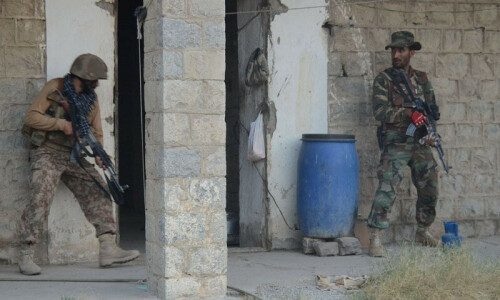
The audacious 16-hour hostage-and-suicide terror attack on a military base in the heart of Karachi has left 13 dead, including 11 Navy officials. What does it portend?
Considering that there were about 10 attackers who successfully mounted a coordinated offensive that inflicted major damage in men and materials including expensive planes, and that at the end of it, the Tehrik-e-Taliban Pakistan (TTP) accepted authorship of the offensive, one thing is for sure: the future of a post-Osama bin Laden al Qaeda is not going to be a laid back one and there is no leave-time for the Pakistani security forces any time soon.
The Mehran Base attack highlights the ability of al Qaeda to function effectively as an extremist, reactionary organisation post-bin Laden. It also shows al Qaeda's impressive operational partnership with the TTP and the latter's operational and logistical prowess to mount attacks on high-value targets of their own.
The Mehran Base attack matches the impudence of the 2009 infiltration of the Pakistan Army headquarters in Rawalpindi when al Qaeda, operating logistically through the TTP, ran riot and held officers and soldiers hostage for 22 hours, killing several. That was the time when confrontation between al Qaeda-TTP and the Pakistani military forces was arguably at its peak since it all began in 2003 with twin attacks on then army chief and president Pervez Musharraf.
It requires a great deal of planning, resource mobilisation, operational logistics and execution to be able to pull off impressive attacks on high-security complexes like the military headquarters and the naval base. Coming within three weeks of bin Laden's swift killing by the Americans in Abbottabad in early May 2011, the attack by al Qaeda-TTP on the naval base in Karachi is the third in a series that carries indelible messages of its readiness of combat and signals that there will be no let off in the strategic fight despite elimination of their iconic leader.
The attack on a Frontier Constabulary base and training center in Shabqadar killed over 80. The Karachi attack has killed over a dozen, not counting the terrorists. The second attack was on a convoy of US diplomats in Peshawar. No intended target was killed here because the vehicles were military reinforcement grade but the message was clear: the US was a target and al Qaeda had not let up in intention or capacity to track and target American interests.
The Karachi attack also proves that TTP, which has accepted responsibility, as with the Shabqadar and Peshawar attacks, continues to show interest in the money from al Qaeda to remain in the game, demonstrating that it's still the best delivery vehicle for al Qaeda operations. Their strategic partnership, therefore, is not only intact, their interdependence is crucial to the declared al Qaeda project to weaken the Pakistani state and take it over. The three lethal al Qaeda-TTP operations also demonstrate that they will continue equating American military forces with Pakistani military forces.
These three attacks are generally expected to effectively silence critics that post-Osama bin Laden al Qaeda was going to buckle. Significantly the troika of terror attacks also comes after Saif al-Adel was announced as bin Laden's acting successor. The succession as well as the high-profile and super deadly attacks are proof, if there was ever required, that al Qaeda is not only alive and kicking but that it's motivation has not wavered nor its funds, strategists and logistics taken any hit. This means that the al Qaeda-TTP combo retains the will to mount significant terror attacks at will. This also means that al Qaeda is morphing into a more deadly and target-focused entity since post-bin Laden it will have to prove more sinister to strike the same quantum of terror. This will have consequences – both positive and negative – for the United States, Pakistan and Afghanistan in particular.
The "positives" from these attacks, and more that are sure to follow this unambiguous trajectory post-bin Laden, are that they are likely to reveal the al Qaeda/TTP hand. This provides projections and patterns to fashion a target-specific counterterrorism strategy and any adjustments that need to be made in it. This for Pakistan translates into coming out of its denial that al Qaeda and TTP are no more a long-term threats and will force Islamabad to stop being pusillanimous on deciding to treat all militant/jihadi groups as one big fat common threat instead of cherry-picking from an assortment of groups that it thinks some of them it can control – something it has failed to even indicate post-Osama. Remember the army chief told the Americans his ranks are perturbed at the operation to eliminate Osama bin Laden? This was an indication that he would be reluctant to radically alter the security policy that the political government has no control over.
The "negatives" are that al Qaeda and TTP are far from finished. Their agenda to drive out the Americans from the region and to overthrow the Pakistani and Afghan states to install Sharia governments with global plans remain intact. The ability to mount impressive attacks high in optics will also arrest any slack in the drive to recruit suicide bombers and raise money for terror resistance and signal its loosely structured but motivated ranks globally to stay the course of violence as instrument of "jihad." This translates into ploughing even more scarce funds in Pakistan and Afghanistan into fighting al Qaeda and TTP at the socio-economic development. Additionally, the Pakistani military and political establishments will have to brace for even more international scrutiny and pressure – including highly likely joint 'boots-on-the-ground' operations – to deliver results.
For Pakistan the pressure is just beginning. The world is running out of patience with Islamabad running with the hares and hunting with the hounds. It will have to cooperate to hunt down Mullah Omar, Aiman Al Zwahiri and others. For Pakistan there's no avoiding the denouement. The sham of the caricaturised accountability of security failure of the intelligence agencies in parliament is far from enough. There is no shift in policy post-Abbottabad. An anti-US, pro-military resolution by parliament may have only ensured Pakistan will be dealt with the hard way. Because Pakistan refuses to become a 'normal' country like those in the rest of the world, its extraordinary posture will be dealt with extraordinarily. Pakistan will have to admit its failing and call for help. It's the only way to stop from tipping over.
Adnan Rehmat is a journalist, analyst and media development specialist. He heads Intermedia, a Pakistani media support NGO.














































